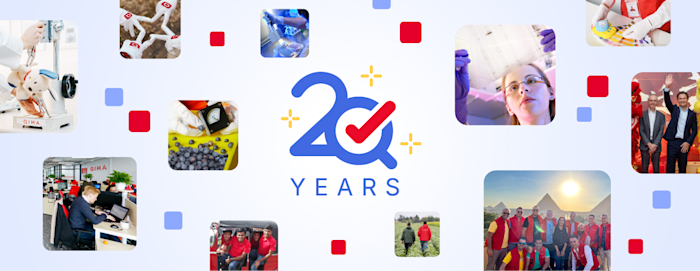
Trump’s 2025 Tariffs: Impact on Supply Chain Success
President Trump’s tariffs, announced on April 2, 2025, as part of “Liberation Day,” are shaking up global trade, hitting supply chains hard with confirmed levies on Canada, Mexico, China, and beyond. With 80% of U.S. companies expecting a major impact on international sourcing (QIMA survey, 2025), businesses need smart strategies to stay ahead.
This article breaks down key lessons, challenges, and actionable steps—plus how QIMA can help keep your supply chain resilient.
Key learnings from past tariff policies and their impact on supply chains.
Challenges businesses face in maintaining compliance, quality, and sustainability.
A practical framework for mitigating risks and adapting to trade policy changes.
How QIMA can support companies adapt to constant change.
Proven strategies to ensure resilience and competitiveness in turbulent trade environments.
Key Learnings from Past Tariffs Policies
Trump’s earlier tariffs taught us plenty – here's what businesses need to know:
Rising Costs Hit Hard: Higher tariffs means higher imports, US businesses passing the cost to consumer is among the most common strategies.
Local Sourcing Gains Ground: In 2024, 10% of U.S. and EU procurement shifted closer to home, cutting lead times and boosting quality control.
Regulatory Complexities Multiply: Tariffs rules add new documentation requirements; compliance can’t be an afterthought.
Quality Takes a Hit: Rapid supplier changes risk product defects. A quality-first mindset is non-negotiable.
Sustainability Trade-offs: Cost pressures challenges ESG goals, yet 70% of firms prioritize green sourcing- balance is key.
Trade Wins Emerge: Despite the challenges, tariffs can open doors to better trade deals, favoring proactive businesses.
Challenges for Businesses
While tariffs create new opportunities, they also pose significant challenges that businesses must navigate to maintain stability and competitiveness.
Supply Chain Disruptions: With 25% tariffs on Canada and Mexico and up to 50% on China, 46% on Vietnam, and 37% on Bangladesh starting today, are delays and bottlenecks already cutting into your profits?
Compliance & Regulatory Risks: Can you keep up with the new tariff rules effective April 2, 2025?
Quality Risks: Will new suppliers deliver under pressure?
Sustainability Setbacks: Can you maintain ESG standards with new suppliers that do not adhere to the same environmental or labor standard?
Pricing Pressures and Consumer Demand: Higher costs mean tough choices, raise prices or eat the loss?
Regional Ripple Effects: U.S. importers face immediate pricing woes, Mexico gains from nearshoring, and China scrambles to adapt—tailored strategies are a must.
A Framework for Navigating Tariff Uncertainty
Turn risks into opportunities with this 5-step framework:
1. Map Your Risks:
Pinpoint tariff-hit regions in your supply chain (e.g., Vietnam, Bangladesh, Canada, Mexico, China)
Calculate increased costs and their pricing impact
Weigh global vs. local sourcing options
2. Vet Suppliers Rigorously:
Audit for quality, compliance, and sustainability standards
Test out nearshoring options to shrink lead times
3. Lock In Quality Control Measures:
Use third-party inspections pre-shipment
Track supply chain with digital tools
4. Stay Compliant-Ready:
Monitor regulatory updates weekly
Stay updated on evolving trade regulations and tariff policies
5. Think Regionally:
Customize plans for US, Mexico and China, Vietnam, and Bangladesh
Leverage tariffs for better trade terms
Work with QIMA to Stay Ahead of Tariff Chaos
QIMA offers solutions to help you manage quality, compliance, and sustainability amidst tariff fluctuations:
Supplier Audits & Risk Assessments: Mitigate compliance and quality risks with thorough checks before you switch.
Product Inspections: Maintain product quality even during supplier changes.
Regulatory Compliance Management: Stay on top of tariff laws with automated tracking.
ESG Certifications: Ensure new suppliers meet your sustainability goals.
Supply Chain Visibility: Use QIMA’s platform to track supplier performance, compliance records, and real-time product quality insights
Turning Tariff Challenges into Strategic Opportunities
While tariff fluctuations present immediate challenges they also compel businesses to reassess and diversify their strategies.
By embracing diversification and local sourcing, companies can mitigate risks and leverage these shifts to negotiate more favorable trade agreements and strengthen their market position.
With QIMA’s expertise in quality, compliance, and sustainability, your business can transform tariff challenges into a competitive advantage. Reach out to learn more today.
Related Articles


